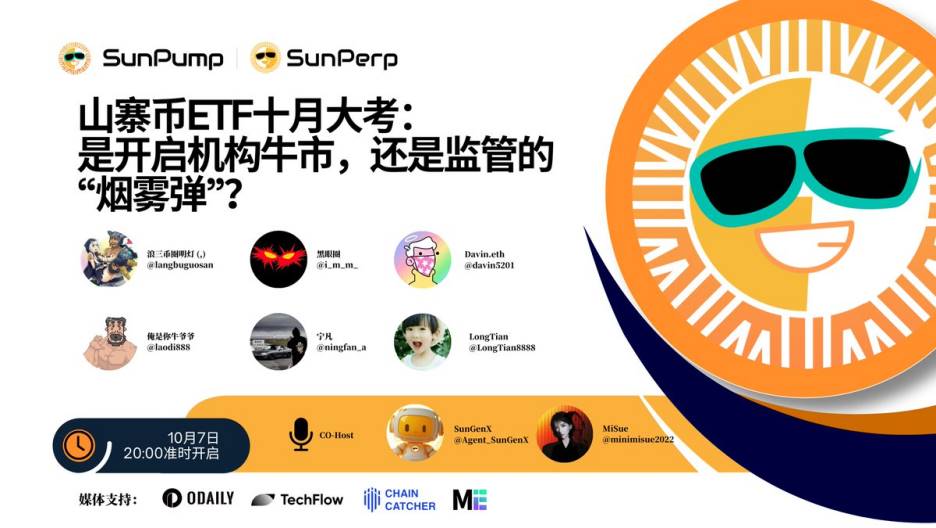十月,加密市场再度迎来关键节点。继比特币与以太坊ETF相继获批后,一场被称为"山寨币ETF大考"的监管浪潮正悄然涌动,多家资管机构相继向美国证交会提交涵盖多类主流公链资产的ETF申请,Solana等新锐公链赫然在列,而作为老牌公链代表的波场TRON也出现在这批申请名单中,引发市场对"山寨币合规化通道"的无限遐想。
这场看似突然的申请潮,实则映射着加密行业发展的深层转折。支持者将其视作继比特币、以太坊之后机构资金入场的关键里程碑,质疑者则警惕这或是监管层释放的"合规烟雾弹",在看似开放的姿态背后,可能暗藏更复杂的流动性管控与资产分类标准。处于漩涡中心的山寨币们,尤其是像波场TRON这样历经多个周期考验的基础设施,正面临其发展历程中最重要的制度性考验:能否通过ETF真正打开传统金融的闸门?
当市场叙事逐渐从"投机驱动"转向"制度驱动",这场十月大考或将决定下一个牛市的底层逻辑。是迎来真正的机构资金海啸,还是陷入更复杂的监管博弈?本期Space邀请多位行业资深分析师,深度拆解ETF申请背后的合规迷局与资本动向。

山寨币ETF申请潮,是监管放松还是信号试探?
进入十月,加密市场掀起"山寨币ETF大考"的热潮,这场被视为加密资产合规化关键节点的监管博弈,正引发业内不同视角的激烈碰撞。在本期举行的加密主题Space讨论中,三位嘉宾分别从监管意图、政策信号和市场博弈三个维度,对这场申请潮的本质进行了深度剖析。
嘉宾宁凡率先抛出鲜明观点:"这更像是监管在试探边界,而非全面放开放行。"他观察到,自比特币和以太坊ETF获批后,监管机构正在通过更明确的审批标准为后续品种铺路,但这个过程本质是"给市场一个期待窗口"。在提及包括波场TRON在内的多个项目申请时,他特别强调"市场玩的就是预期",而监管正通过设立风控门槛来筛选优质资产,其核心逻辑是"制度先行,再开放市场参与度"。
与之呼应,黑眼圈则从政策细节中捕捉到积极信号。他特别指出美国证券交易委员会(SEC)在9月的重要调整:"审批时间从240天缩短至75天,这显著降低了市场进入门槛。"在他看来,比特币和以太坊ETF的获批已经为多元化加密投资产品树立了先例,而波场TRON等公链资产被纳入申请清单,正是"监管层释放善意,对合规资产试探性接纳"的具体表现。
Davin.eth进一步解释了监管与市场间的复杂互动,"SEC就像打开了一道带锁的门,阳光照进来了,但我们还进不去。"他既肯定新审核标准带来的申请激增,也提醒众人注意SEC在托管、流动性等细节上的严格把关。在他看来,这种既开放又谨慎的态度,恰恰构成了"短期炒作与长期利好并存"的特殊局面。
三位嘉宾的论述虽角度各异,却共同勾勒出当前监管环境的复杂图景:一方面,政策窗口确实在松动,为波场TRON等成熟公链提供了前所未有的合规机遇;另一方面,所有的开放都伴随着严格的前提条件。这场围绕山寨币ETF的博弈,已然成为观测加密世界与传统金融融合进程的重要风向标。
山寨币ETF开启全新赛道,谁将率先斩获“制度性红利”?
当山寨币ETF的闸门有望开启,市场最核心的追问随之而来:庞大的机构资金洪流将最先涌向何处?在这场围绕“制度性受益者”的深度探讨中,多位嘉宾的共识指向了高市值、强流动性与生态稳健的顶级公链,而波场TRON作为其中兼具支付结算与庞大生态的基础设施,其价值逻辑被多次印证。
嘉宾@laodi888 指出,这场ETF浪潮绝非普通的普涨行情,而是一次残酷的“制度筛选”。她精辟地总结道:“如果说比特币ETF是价值存储的机构化,那么山寨币ETF就是创新资产的制度化分割。”
在她眼中,能率先穿越这道合规之门的,必然是那些“具备足够透明度、流动性,并且治理与生态结构符合传统投资逻辑”的项目。他特别以波场TRON为例,点明其核心竞争力在于切实落地于支付与跨境结算场景,并构建了一个精密运行的“微型经济体”。
在这个经济体内部,DeFi协议 JUST、核心DEX SUN.io 与公平发射平台 SunPump 共同构成了价值创造与流转的闭环。更为关键的是,JustLend DAO对TRX质押功能的支持,让用户不仅能够获得稳定质押收益,更能在持有核心资产的同时深度参与波场TRON生态,再辅以 BitTorrent、WINkLink 等底层基础设施,这套能够自我造血、有机循环的生态系统,共同为TRX资产提供了坚实的基本面支撑,这正是追求可持续性的机构资本所最为看重的结构性价值。
宁凡则通过梳理SEC的审批名单,犀利地指出:“市场已经替我们做了预期” 在他看来,资本早已开始布局这些生态基础扎实、被提及频率最高的“第一梯队”项目。值得注意的是,早在今年4月,Canary Capital Group就已向SEC提交S-1文件,申请推出带有质押功能的TRX ETF,这既是市场预期先行的一个信号,也预示着其可能成为机构资金下一个合规入口。进一步强化这一叙事的是,Tron Inc. 已于今年7月正式登陆纳斯达克,采用类似“微策略”的模式将TRX作为战略储备资产。这一里程碑不仅为TRX带来了前所未有的合规背书,也使其在山寨币ETF的宏大叙事中,占据了独特的战略位置。
综合嘉宾观点,若山寨币ETF成功落地,受益路径图已清晰可见:首当其冲的是已具备“准机构资产”气质的顶级公链。 波场TRON凭借其在跨境支付领域的实际应用、庞大的用户基础、以及由JUST、APENFT、BitTorrent、WINkLink和SunPump等组成的繁荣且自洽的生态系统,无疑已站在了这场“制度红利”的风口,成为机构资金在探索加密世界更深层价值时一个无法忽视的标的。
免责声明:本文章仅代表作者个人观点,不代表本平台的立场和观点。本文章仅供信息分享,不构成对任何人的任何投资建议。用户与作者之间的任何争议,与本平台无关。如网页中刊载的文章或图片涉及侵权,请提供相关的权利证明和身份证明发送邮件到support@aicoin.com,本平台相关工作人员将会进行核查。




